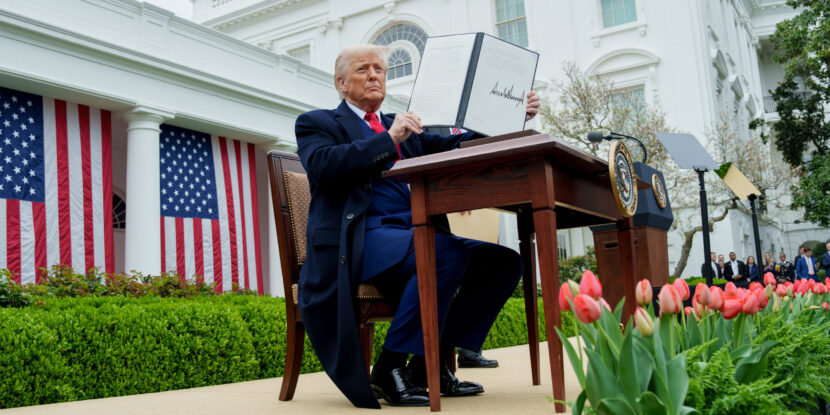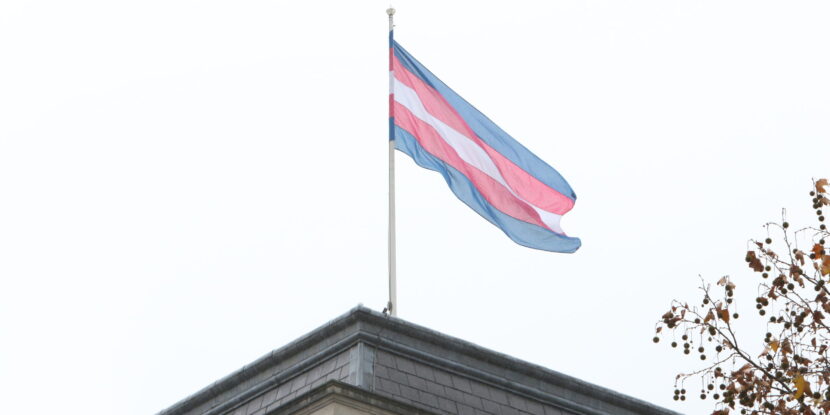
PULSE POINTS:
❓What Happened: President Donald J. Trump declared a national emergency to impose tariffs on numerous countries in April, sparking lawsuits challenging his executive authority.
👥 Who’s Involved: President Trump, five businesses, the Liberty Justice Center, a dozen states.
Your free, daily feed from The National Pulse.
📍 Where & When: U.S. Court of International Trade, New York, May 13.
💬 Key Quote: “That statute doesn’t actually say anything about giving the president the power to tariff,” said Jeffrey Schwab of the Liberty Justice Center.
⚠️ Impact: The tariffs have generated substantial revenues for the U.S. and forced a number of countries into negotiations with the Trump administration, offering to lower their own tariffs and open their markets to U.S. exports. However, anti-tariff lawsuits could lead to Supreme Court rulings on the use of presidential trade powers.
IN FULL:
A federal trade court is hearing challenges to President Donald J. Trump’s tariffs, introduced under a national emergency declaration. Some small businesses and states now argue that the president exceeded his legal authority.
The legal dispute, brought before the U.S. Court of International Trade on May 13, centers on Trump’s April 2 declaration of “Liberation Day,” when he invoked the 1977 International Emergency Economic Powers Act (IEPPA) to impose tariffs on many imports.
Five businesses, represented by the Liberty Justice Center, argue that IEPPA does not explicitly grant the president authority to impose tariffs. “That statute doesn’t actually say anything about giving the president the power to tariff,” said Jeffrey Schwab, senior counsel at the nonprofit.
The administration, however, points to historical precedent, citing President Richard Nixon’s use of emergency tariffs during the 1971 economic crisis under the 1917 Trading With the Enemy Act, which informed IEPPA’s language.
The lawsuits have brought together an unusual coalition, including states led by Democratic governors and libertarian groups. A dozen states have filed separate suits against the tariffs, with hearings expected in the coming weeks. Kathleen Claussen, a Georgetown Law professor, suggested these cases might ultimately reach the Supreme Court.
Trump’s tariffs have already netted over $16 billion in revenues in April alone, contributing to a budget surplus for that month, and persuaded companies such as Nvidia to bring manufacturing operations inside the U.S.

PULSE POINTS:
❓What Happened: Four major Pride events in Britain have banned political parties from participating officially, citing solidarity with the transgender community.
👥 Who’s Involved: Birmingham, Brighton, London, and Manchester Pride organizations; British political parties; transgenders; the Supreme Court of the United Kingdom; the Equality and Human Rights Commission (EHRC).
Your free, daily feed from The National Pulse.
📍 Where & When: Britain, announcement made following a Supreme Court ruling that determined sex is determined by biology, not gender identity, for the purpose of equality law.
💬 Key Quote: “In this moment, we choose to stand firmer, louder, and prouder in demanding change that protects and uplifts trans lives,” said Pride organizers.
⚠️ Impact: Political parties are excluded from major Pride events unless they commit to returning transgender “women” to women’s single-sex spaces and sports, amidst ongoing debates over gender recognition laws.
IN FULL:
Four of the United Kingdom’s largest LGBT Pride organizations have announced a ban on political parties participating in their events in an official capacity, citing solidarity with transgenders. Birmingham, Brighton, London, and Manchester Pride groups issued a joint statement explaining the decision, which they said was driven by a lack of commitment to transgenderism among political parties.
The announcement follows a Supreme Court ruling that defined “woman” under the Equality Act as being based on biological sex. While this decision has been welcomed by many citizens and campaigners, particularly lesbian and gender-critical groups, it has been resisted by transgender activists.
The Pride groups stated that the ruling highlighted the need for urgent action and described their move as a refusal to “platform those who have not protected our rights.” They also called for reforms, including full “protections” under the Equality Act—likely meaning renewed access to women’s spaces—as well as improved access to transgender medical interventions and sustained funding for trans-led services.
“In this moment, we choose to stand firmer, louder, and prouder in demanding change that protects and uplifts trans lives,” the Pride groups said in a joint statement.
The Supreme Court ruling stems from a case involving the Scottish Parliament’s gender balance legislation, which included transgenders in quotas for women. The court clarified that the Equality Act’s definition of sex is based on biology, not gender identity, even for those holding a government Gender Recognition Certificate.
The Equality and Human Rights Commission (EHRC) subsequently issued guidance emphasizing that access to single-sex spaces must align with biological sex.
Some groups, such as Scottish Lesbians, welcomed the clarification, stating it protects women’s rights. They have criticized Pride organizers for excluding lesbians by prioritizing transgender issues.
The decision to exclude political parties affects events that collectively attract over a million attendees annually. Political figures, including Prime Minister Sir Keir Starmer and former Prime Minister Boris Johnson, have historically participated in Pride events.
Image by Foreign, Commonwealth, and Development Office.
show less

 1 month ago
4
1 month ago
4








 English (US) ·
English (US) ·